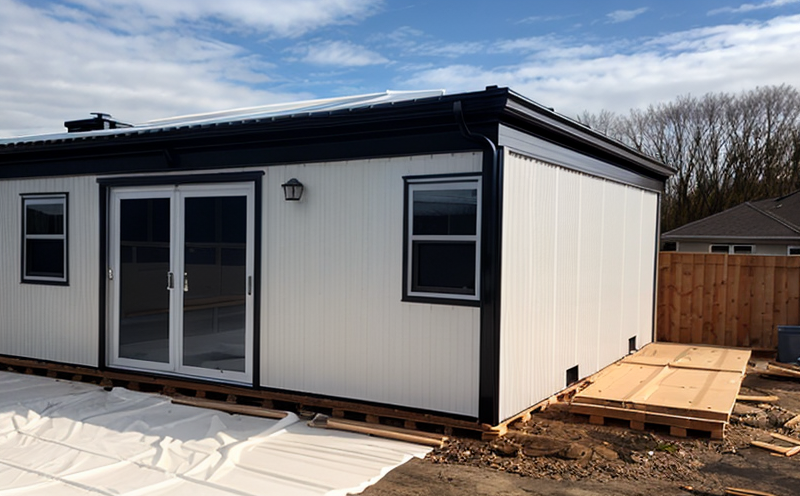EN 13162 Insulation Products Performance Testing
The EN 13162 standard is an integral part of the European Union's regulatory framework for insulation products, ensuring that they meet stringent performance criteria. This service focuses on testing thermal and moisture resistance properties to ensure compliance with building envelope design requirements.
Insulation plays a crucial role in enhancing energy efficiency by reducing heat loss through walls, roofs, and floors. Proper insulation also helps maintain indoor comfort levels while minimizing environmental impact. The EN 13162 standard addresses both thermal conductivity (λ) and the influence of moisture on these properties.
This testing is particularly important for buildings that are exposed to various weather conditions, such as high humidity or extreme temperatures. By adhering to this standard, manufacturers can demonstrate their products' reliability under diverse environmental stressors. This ensures long-term performance and sustainability in building design.
The process involves subjecting samples of insulation materials to controlled temperature and relative humidity cycles for extended periods. The goal is to evaluate how the material behaves over time when subjected to these conditions, providing insights into its durability and efficiency.
Testing typically includes measuring thermal resistance (R-value) before and after exposure to moisture. This helps identify any degradation in performance due to water intrusion or condensation formation within the insulation layer. Additionally, tests can assess vapor permeability, which is essential for preventing interstitial condensation inside walls.
The methodology strictly adheres to ISO 9237 and EN 13162 standards, ensuring accuracy and consistency across all measurements. Compliance with these regulations not only guarantees product quality but also facilitates easier market entry into European countries that recognize this standard.
Our laboratory uses state-of-the-art equipment such as climate chambers capable of simulating real-world environmental conditions accurately. Specimen preparation follows precise guidelines outlined in the relevant standards, ensuring reliable results. After testing, comprehensive reports are generated detailing test parameters, observed behaviors, and compliance status against specified criteria.
This service is vital for quality managers responsible for maintaining product integrity throughout production cycles. Compliance officers can leverage this information to ensure their offerings meet regulatory requirements effectively. R&D engineers benefit from this insight into material behavior under specific conditions, allowing them to refine formulations continuously. For procurement professionals, knowing that a supplier adheres to such rigorous testing enhances trust in the supply chain.
By investing in EN 13162 compliance, businesses demonstrate their commitment to sustainable construction practices and energy-efficient design principles. This can lead to cost savings through improved building performance over time, reduced heating/cooling expenses, and enhanced occupant satisfaction.
- Improved Energy Efficiency: Ensures optimal thermal performance of insulation materials.
- Durable Performance: Validates that the material can withstand environmental stresses without significant degradation.
- Sustainability: Promotes environmentally friendly building practices through reliable product choices.
Scope and Methodology
The scope of EN 13162 encompasses the thermal performance of insulation products, specifically focusing on their resistance to heat flow. This includes both static and dynamic testing conditions that simulate real-world applications.
Thermal conductivity (λ) measurements are conducted using standard procedures such as guarded hot plate methods. These tests measure how easily heat can pass through a given thickness of the material at specified temperatures. Dynamic testing involves exposing samples to fluctuating temperature cycles, reflecting actual usage scenarios more closely.
Moisture resistance is evaluated by subjecting specimens to controlled humidity environments for extended durations. Specimens are then dried, and thermal conductivity re-measured post-exposure. This helps determine whether the material retains its insulating properties after prolonged exposure to moisture.
The standard also covers vapor permeability testing, which assesses the ability of a material to allow water vapor to pass through while preventing liquid water from doing so. This is critical for preventing interstitial condensation within walls and roofs.
All tests are conducted in climate chambers that can replicate various environmental conditions found worldwide. Specimens undergo rigorous preparation according to precise guidelines, ensuring consistent results across multiple trials.
Compliance with EN 13162 ensures that insulation products perform consistently under diverse climatic circumstances. This guarantees long-term durability and energy efficiency, contributing significantly to sustainable construction practices.





